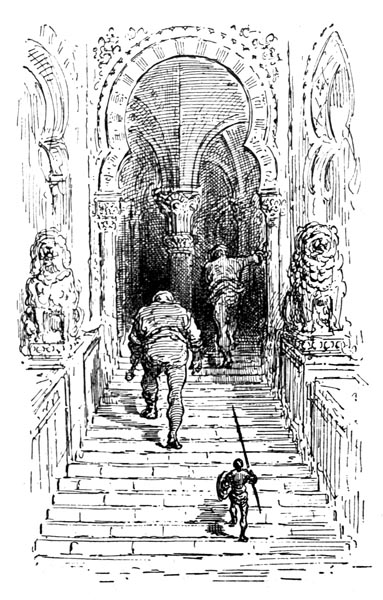Ariosto: Orlando Furioso
Canto XIII: The Tale of Isabella
Translated by A. S. Kline © Copyright 2021, All Rights Reserved.
Illustrations photographed and digitally restored from the Fratelli Treves edition (Milan, 1899) by A. D. Kline.
This work may be freely reproduced, stored and transmitted, electronically or otherwise, for any non-commercial purpose.
Conditions and Exceptions apply.
Contents
- Canto XIII: 1-8: Isabella begins her tale
- Canto XIII: 9-12: She and Zerbino plan to elope
- Canto XIII: 13-18: The scheme goes awry and she is shipwrecked
- Canto XIII: 19-28: Odorico attempts to rape Isabella
- Canto XIII: 29-32: She escapes him, but is then taken captive
- Canto XIII: 33-41: Orlando now disposes of her captors
- Canto XIII: 42-44: He departs accompanied by Isabella
- Canto XIII: 45-50: Melissa visits Bradamante with news of Ruggiero
- Canto XIII: 51-54: She tells her of the means to free him
- Canto XIII: 55-73: Melissa tells of the women of the House of Este
- Canto XIII: 74-79: Bradamante is enticed into the enchanted mansion
- Canto XIII: 80-83: We return to King Agramante and the Moorish camp
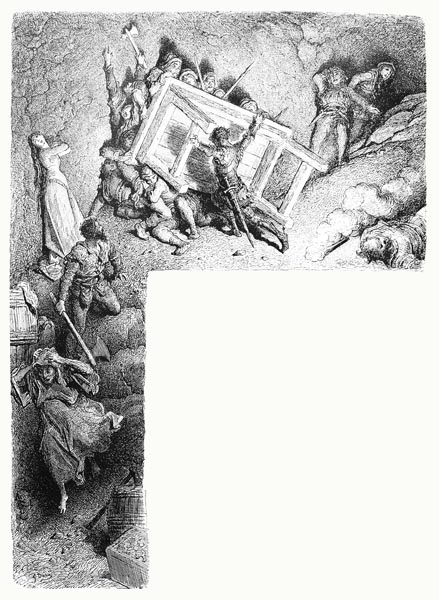
Canto XIII: 1-8: Isabella begins her tale
They were fortunate, the knights, in those days,
Who, in some valley, or some gloomy wood,
Or in some cavern, midst the mountains’ maze,
Where lions, bears and serpents bore their brood,
Found that which, in the palaces we raise,
Is scarcely known to judges, wise and good:
I mean a sweet young maiden deemed worthy,
In her first bloom, of the name of beauty.
I’ve told you how Orlando came to find
A maiden, and how, wondering at her fate,
He asked who had, in that dark cave, confined
So fair a one; well, now, I shall relate
How, although to many a sigh resigned,
In sweetest speech, this angel, incarnate,
Explained, and quite as briefly as she could,
To the Count, how the woeful matter stood.
‘Though I’m certain,’ she said, ‘that I, brave knight,
Will suffer for what I’m about to say,
Since, to him who pens me here, out of sight,
This old woman will every word relay,
Yet I would have you hear the tale outright,
And pray tis not with this poor life I’ll pay.
Though what more can I hope from it, say I,
Than that my gaoler should decree I die?
Isabella am I, once the daughter
Of Galicia’s most unhappy king;
Once, I say, for I am his no longer,
But the child of pain, and woe, and suffering.
Love’s fault; of whom I complain no further
Than to say we see him first applauding
All love’s deeds; he lulls us most sweetly,
And yet his snare deceives us completely.
Once it would seem Fortune smiled upon me,
Noble and wealthy, honest, young, and fair,
Yet now brought low, to woe and poverty,
And, if there be aught worse, in that I’ll share.
But you shall know the root of this ill tree,
Which bore such evil fruit, to my despair;
For, though your aid grants them no shorter lease,
I see not how my woes you could increase.
My father at Bayonne arranged a tourney,
It must be quite twelve months ago today,
And so there came, from many a country,
Drawn by the rumour, a renowned array
Of knights, and amidst these Love, to me,
Or his virtues, perchance, in that display,
Showed such, that he alone my praises won,
Zerbino, the great King of Scotland’s son.
And when I viewed him later in the field,
Performing wondrous deeds of chivalry,
I fell in love with him, to such did yield,
And knew myself no longer mine, wholly.
Thus, my love for him was ill-concealed,
Ever his face adorned my memory,
Since I had set my heart on nothing mean,
But on the worthiest the world has seen.
For my Zerbino was pre-eminent,
Beyond, in worth and looks, every other.
He showed me love and was, I think, content
To return my own, with no less ardour.
Nor did we lack a friend, ever-present,
To convey our love to one another,
Such that we could unite, in heart and mind,
Though yet apart and, in that, comfort find.
Canto XIII: 9-12: She and Zerbino plan to elope
When the tourney was completed, though,
And he returned to his own native shore,
If you know aught of love, then you must know
How, night and day, I yearned for him full sore.
And that no less a flame burned in him so,
Quite as deep within the heart, I feel sure.
And we could see no answer whatsoever,
But to find a way we might be together.
Due to our different faiths, you understand,
(He a Christian, I a Saracen)
He could not ask my father for my hand;
We must elope, and choose the how and when.
Beyond our wealthy city, which did stand
Amidst the green fields, I had a garden,
On a slope, a little distance from the sea,
From which I could view the space around me.
It seemed the place where we might achieve
What our differing religions denied us.
Zerbino the whole plan did now conceive,
And showed me the decree that would bind us.
By Santa Marta, hidden to deceive
All watchers, was a ship; none would find us;
Its captain Odorico of Biscay,
On land or sea, a good man in a fray.
Unable to, himself, perform the thing,
Since he’d been ordered by his father
To aid, in his time of need, the French king,
He’d send Odorico, thus to further
The scheme, as amongst his true friends being
Truer, and more loyal, than any other;
And would it not be fine if, here, indeed,
For every man such friendship was decreed.
Canto XIII: 13-18: The scheme goes awry and she is shipwrecked
And he would come at the appointed hour
In his armed vessel to bear me away.
And when the time came, there, in my bower,
They found me ready. Anchoring in the bay,
Odorico worked whate’er was in his power,
To keep me safe, his men, in close array,
Disembarking from a boat on the river,
At dead of night, this service to deliver.
Thus, I was carried to the ship at anchor,
Before any in the city were aware.
Of the household servants, a fair number
Fled, naked and unarmed, a few died there,
While the rest, being subject to capture,
Were brought away with me, in my care.
So, I denied my home, most joyful, though,
In hoping, soon, to be with my Zerbino.
And yet, we’d scarcely sailed by Mungia,
When a gale attacked us, on the port side,
Which troubled both sea and sky together,
Raising great breakers on a flowing tide;
A north-westerly arose, that blew forever,
And grew in power till waves the ship did hide,
And still increased, blowing with such force,
Though the crew strove, it drove us from our course.
The sail was reefed, the tall mast was downed
To the boards, and a storm-jib flown, in vain;
Driven leeward, we were set to run aground,
Near La Rochelle, nor could the vessel gain
Against that wind; unless some aid was found
From the heavens, brief life would we maintain.
The gale now drove us faster, with the flow,
Than arrow ever sped from out the bow.
Odorico, conscious of present danger,
Sought a remedy that often goes awry,
The ship’s boat he now made shift to lower,
And to it we descended, he and I;
Two followed, and soon many another
Would have swamped it, for some sought to try,
But our little crew countered with the sword;
We cut the ropes, and ran, with those aboard.
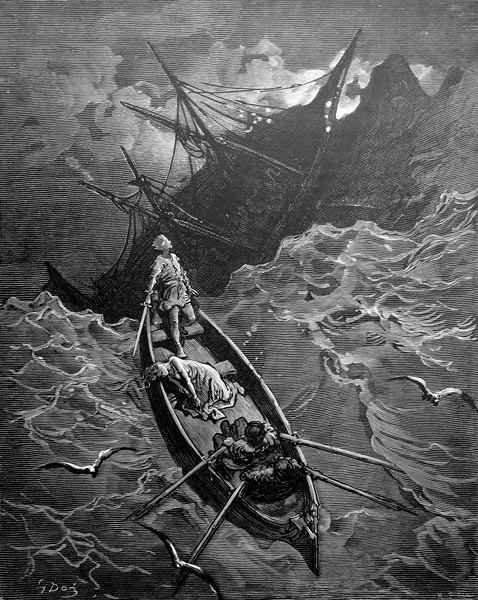
Driven landward, we managed to reach shore,
We few who had embarked, while all the rest,
With the vessel were drowned, and seen no more;
We lost everything aboard that we’d possessed.
Yet I thanked the Endless Good we adore,
Eternal Love which my own life had blessed,
That I had not been doomed to perish so,
Fated ne’er to see my own Zerbino.
Canto XIII: 19-28: Odorico attempts to rape Isabella
Though I had lost many a thing that day,
Clothes, and jewels, and much other treasure,
I hoped to find Zerbino, though astray,
Content that the sea should seize its measure.
No dwelling appeared, nor any pathway,
On that bleak shore, wrought for our displeasure,
Only a wooded slope thrashed, ceaselessly,
By the wind, its base by the raging sea.
Now, that cruel tyrant Love, who’s forever
Disloyal to every faithful promise,
And joys in marring our schemes, as ever
Had found his pleasure in destroying this,
And, in that sad and deceitful temper,
Changed good to ill, my comfort, with relish,
To despair; the friend, Zerbino trusted
Cooling in loyalty, now hotly lusted.
Whether while at sea he’d desired me,
Yet had lacked the boldness to show it there,
Or whether on that shore, quite solitary,
He saw the chance to further the affair,
He planned to seize the opportunity
To work his will on one left in his care,
But first addressed himself to the two
That had, with him, formed our skiff’s small crew.
The first, a Scot, was named Almonio,
Praised as a perfect knight, one ever true
While of his company, by Zerbino,
With this Odorico, trusted anew
With my protection. Said the latter, though,
For me to go on foot would never do,
And begged the knight to haste to La Rochelle,
And find a mount for me; themselves as well.
Almonio, not fearing any ill,
Departed swiftly and, without delay,
Reached the city, quite hidden by the hill,
Which was no more than six short miles away.
Odorico now sought to work his will,
And his plot to the other did display,
As much because the man seemed a fixture
As that he trusted in his base nature.
Corebo of Bilbao was his name,
He of whom I speak, the other there,
Who was raised from infancy with that same,
Odorico, who thus saw fit to share
His traitorous plan, quite devoid of shame,
With the fellow; thinking he would care
More to indulge a friend who claimed his trust,
Than stay faithful, and support what was just.
But Corebo, who was noble and courteous,
On hearing of the plot, felt indignation,
Called him a traitor, and quite furious
Wished him, and all his like, to damnation.
Their hearts full of ire, and angered thus,
They flourished their swords, in frustration.
At this, I fled in fear towards the wood,
That clothed the slopes in our neighbourhood.
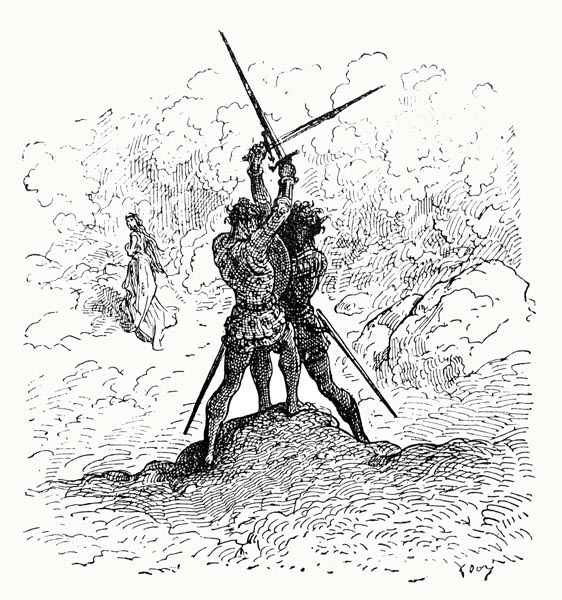
Odorico, most skilful in a fight,
Had, in a few blows, gained such advantage
He quickly left for dead the other knight,
And followed, in pursuit, my swift passage.
Desire lent him wings to win, outright,
That race, if I mistake not the adage,
And taught him many a flattering plea
That I should yield, and end his misery.
But twas in vain, for I with firm intent
Had rather died, there and then, than yield.
When every plea, flattery, and ill-meant
Threat proved worthless, he sought to win the field
By force, regardless of my non-consent;
Nor did entreaty serve me as a shield,
Reminding him of my Zerbino’s trust
In one who seemed at pains to prove unjust.
When I perceived my prayers were all in vain,
And that I could not hope for rest or aid,
Since he his wickedness would yet maintain,
As, like some half-starved bear, attacks he made;
With hands and feet, I struck, and struck again,
And at him, tooth and nail, great ire displayed,
While flailing at his mouth, and nose, and eyes,
Sending my woeful pleas, towards the skies.
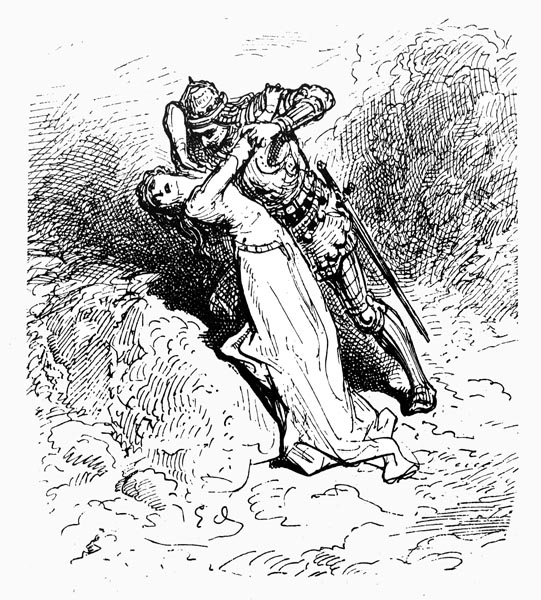
Canto XIII: 29-32: She escapes him, but is then taken captive
Whether my cries they chose not to ignore,
That could perchance be heard for miles around,
Or whether they always headed for the shore,
Whenever any vessel ran aground,
I saw a vast host down the hillside pour,
And soon the pathways to the beach they found.
Odorico, saw them come and, thereupon,
Left me, and, in a moment more, was gone.
That crowd, indeed, saved me from the traitor,
But, to prove the adage, chose to conspire;
For I fell, as common folk hold ever,
From out the frying pan, into the fire.
True my state is not that of dishonour,
They’re not so wicked, nor my case so dire;
They’ve not sought to violate my person,
Though little that is good or kind have done.
Yet that I am a virgin maid they know,
And, as I am, may fetch a higher price;
Nine months have come and gone while, to my woe,
This living grave as lodgings did suffice.
All hope is lost of aid from Zerbino,
While, from their speech, I gather their device
Is that some merchant will buy me, with gold;
To the Sultan, in the East, I’ll then be sold.’
So twas the noble lady told her tale,
Though interspersed with gestures and with sighs;
Her angelic mode of speech oft did fail,
That might pity from an asp or viper prise.
While, her sad woes, to our knight, she did unveil,
Or some small comfort sought to realise,
A score of men made entry to the cave,
Armed with here a spear, and there a stave.
Canto XIII: 33-41: Orlando now disposes of her captors
Their leader, his face devoid of pity,
Was possessed of but one dull, squinting eye,
The other blinded by some blow, that neatly
Had sliced his jaw from ear to ear; no lie.
He, on seeing our knight, seated calmly
Beside the maid, turned to his friends nearby,
And cried: ‘Behold, another bird we’ve caught
In our fine net, though not a fowl we sought!’

Then, speaking to the Count: ‘I never saw
One so happily, or opportunely, met.
Perchance you guessed, or were told before,
New armour I did need, but none could get.
And that sable tunic of yours, what’s more,
So fashionably upon your shoulders set,
Has arrived, just at the right time, indeed,
To address, nay satisfy, my urgent need.’
With a wry smile, Orlando rose, and then
To the ugly scoundrel made this reply:
‘You may purchase them both, yet again,
If you do, then the price is somewhat high.’
And from the fire which lit that gloomy den,
He seized a burning brand, it being nigh,
And struck the rogue, by chance I suppose,
On the spot where the eyebrows meet the nose.
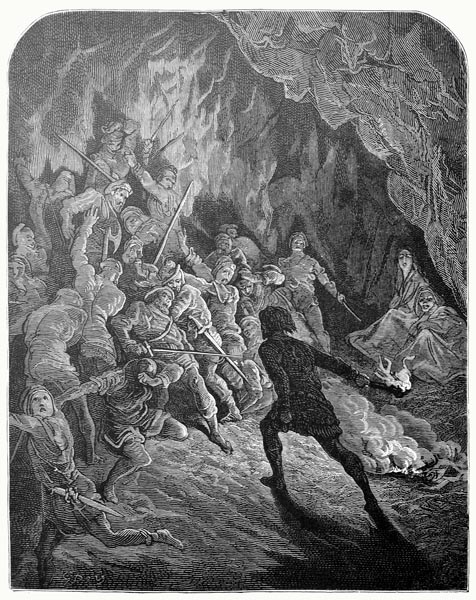
Both his eyes were scorched by the splinter
But it wrought the most damage on the left,
And in doing so it robbed him, thereafter,
Of the sight of which the right was bereft.
Nor was our knight content with the offer,
But sought to send that connoisseur of theft
To join the souls Charon doth ever keep
Plunged in lakes, infernally hot and deep.
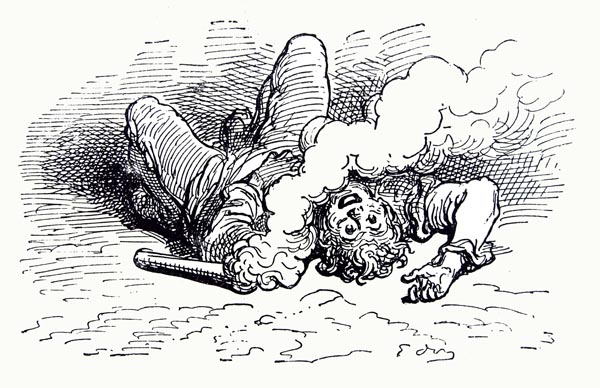
In the cave, sat a table, made of wood,
Two palms thick, and spacious in extent,
On one large rudely-fashioned foot it stood,
Behind it were that crew of ill-intent.
As easily as only our knight could
Towards the rogues that mighty thing he sent,
Flinging it as readily at all those there
As Spaniards hurl their reed-spears through the air.
Here a head was crushed and there a thigh,
A chest, or arm, or a swollen belly,
Some were slain, some only maimed thereby,
(While the least harmed fled the most promptly),
As a nest of vipers are seen to lie,
Crushed beneath a stone both large and heavy,
With battered heads and tails, when winter’s done,
Caught while they are basking in the sun,
And damaged so, who knows to what extent,
Though this one’s dead, that one lacks a tail,
Another cannot move, robbed of intent,
And writhes and coils, yet all to no avail,
While this, with whom the saints are more content,
Through the grass, slithers on some hidden trail.
Grievous the stroke, yet no great wonder though,
Since it was dealt by mighty Orlando.
Those who were scarcely harmed by his bold feat,
(Bishop Tilpin seven such did proclaim)
Sought safety as they ran from sore defeat,
But Orlando thwarted them of their aim.
And having caught those few, like bales of wheat
He trussed them, to render them quite tame,
With lengths of rope lying coiled on the ground,
Which deep within the woodland cave, he’d found.
That done, he dragged them forth to the light;
Then, to where an old rowan cast its shade;
With his sword he trimmed the branches, our knight,
Then hung the villains there in the glade,
A fine banquet for the crows, in open sight,
(No hooks he needed, those the branches made)
And left them hanging for the birds to peck,
Once he’d hoisted the villains by the neck.
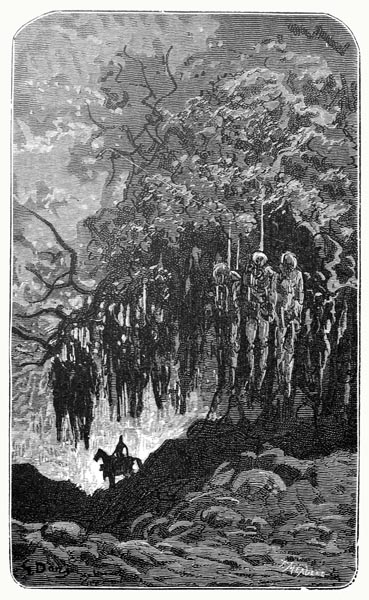
Canto XIII: 42-44: He departs accompanied by Isabella
The old woman, a friend to that base crew,
When she saw the rest were wounded or dead,
Tore her hair and, escaping what was due,
Through all the green, and leafy, labyrinth fled,
While weeping and lamenting as she flew,
Impelled by fear, down stony paths that led
To a river, and there met a knight, so fated;
Though who that was remains to be related.
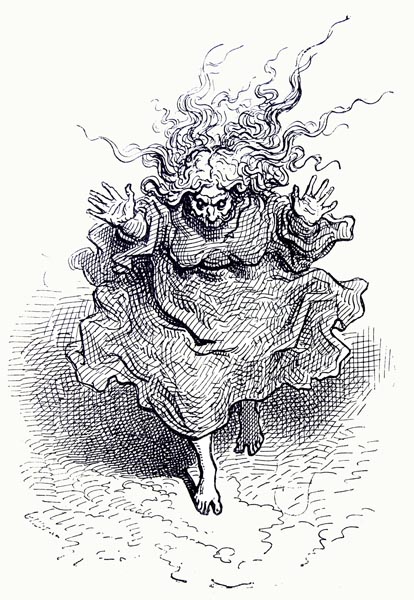
I turn to Isabella, who requested
That Orlando not leave her there alone,
Declaring she would go where’er he led.
The knight, who every courtesy had shown,
Consoled her, and when pale Aurora sped,
Wreathed with roses, in robes with scarlet sewn,
Through the sky, on her accustomed journey,
The knight and the maid departed, swiftly.
Not a thing of note did they encounter,
Pursuing their path for many a day;
Though, in the end, they met a traveller,
That led a captive, as he went his way.
More would I say, but a little later;
Since a tale as dear now calls me away:
For Bradamante I've left there, above,
Languishing, as yet, in the toils of love.
Canto XIII: 45-50: Melissa visits Bradamante with news of Ruggiero
That lovely warrior, longing, in vain,
For the swift return of Ruggiero,
Lay in Marseilles, pursuing a campaign
Of harassment against the pagan foe,
(The scourge indeed of every hill and plain
Throughout Provence, and Languedoc also)
Performing the true office, day and night,
Of a wise leader, and a valiant knight.
She waited there, much time having passed
In which Ruggiero ought to have returned,
And, not seeing him, felt, herself, harassed,
Fearing harm done to one for whom she yearned.
Yet, as she sat alone one day, downcast,
Bemoaning her sad fate, relief she earned,
For Melissa drew near, who, with the ring,
Had healed that heart Alcina’s love did sting.
Finding she’d returned without her lover,
After so long a space, you understand,
The heart within her began to quiver;
Pale and faint, our fair knight could scarcely stand.
But the kind Melissa came, smiling, to her,
Seeing her look of fear, and took her hand,
And, comforting her, wore a joyful face,
On bringing better news to that sad place.
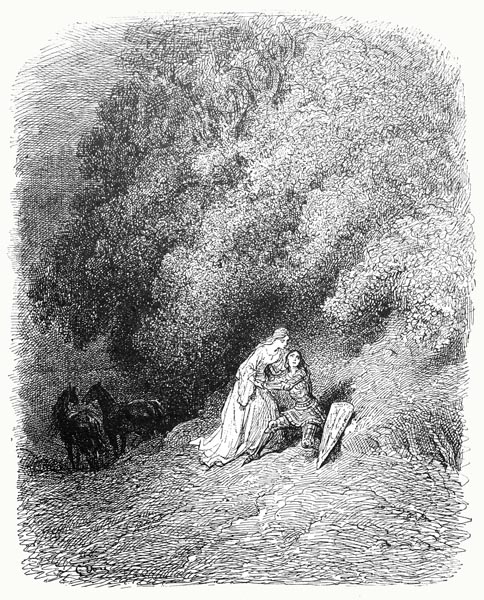
‘Fear not,’ she cried, ‘for your Ruggiero
Is yet alive and well, and still adores you,
But, once again, his freedom’s lost; your foe,
Has robbed him of it; without more ado,
You need to mount the saddle now, and go,
If you would find him; follow me anew,
And if you do, I shall reveal the deed,
By which your Ruggiero may be freed.’
And then she told her of the magic spell
Atlante had cast, and of the mansion;
How by simulating her face, as well,
He’d led her knight to that enchanted prison,
(She captive to a giant) where it befell
That once within he found it but a vision,
And how likewise the wizard cheated all,
Knight and ladies, in that deceptive hall.
He seemed to each, that wondrous enchanter,
To be the one that each of them desired,
Lady, squire, companion, friend, whomever;
For by more than one form is love inspired.
And then they searched the mansion forever,
Both wearily, and fruitlessly, enmired;
And yet such was their longing even so
To win their fond desire, they could not go.
Canto XIII: 51-54: She tells her of the means to free him
‘As soon,’ she said, ‘as you approach the place
Wherein the magic mansion will appear,
Atlante will don Ruggiero’s face,
And his form, and greet you as you draw near.
While by his art twill seem he doth embrace
Defeat at another’s hands (such my fear),
Trusting you will seek to aid your knight,
And, thus, amidst the rest be penned outright.
So that you may escape this hidden snare,
In which so many others have been caught,
Though he seems your Ruggiero, yet, beware,
Believe it not, though your swift aid is sought.
Knowing the wizard, in false form, is there,
Take his life, yea, slay him and fear naught.
It is not Ruggiero who shall die,
But he who seeks to work you harm, thereby.
I know, full well, it will seem hard to you,
To slay a knight who looks like Ruggiero,
But trust not to your eyes, all there’s untrue,
Tis mere enchantment, a deceptive show.
Be certain, since the mansion we shall view,
To hold as firm when we perceive the foe.
For never shall you meet with wedded bliss,
If you let the wretch live, through cowardice.
The fair warrior-maid, with that intent,
(To slay the false enchanter) once she’d armed,
Followed Melissa, swiftly, where she went,
Whom she trusted as if her life were charmed,
By cultivated fields, through woods, content
To be led, and bleak stretches, unalarmed.
The latter seeking, by sweet conversation,
To ease the long road to their destination.
Canto XIII: 55-73: Melissa tells of the women of the House of Este
The fairest subject that she e’er did mine,
Oft repeated in Bradamante’s ear,
Was that of her and Ruggiero’s line,
The demi-gods now destined to appear.
For Melissa all the secrets could divine
Of those eternal gods that rule us here,
And had foreknowledge, in her day, of all
That midst the future ages would befall.
‘My truest guide, I do well remember,’
The warrior maid thus addressed the mage,
‘How, on a day, fair folk you did number,
Handsome offspring, born to adorn their age;
So now I beg you, speak of some member
Of that race, some lady, lovely and sage,
If one so virtuous time shall provide.’
And thus, Melissa, courteously, replied:
‘From you chaste women will e’er descend,
Mothers of emperors and mighty kings,
Preservers and mainstays, without end,
Of mighty realms, of which the poet sings;
And they in women’s garb will here defend
Worth and merit, all honourable things,
As well as will the men in armour, truly,
With prudence, modesty, and piety.
Yet were I to speak to you of all those,
Of your long line, right worthy to be praised,
Too long my speech, for none I would suppose
Deserve from such a tale to be erased.
And yet it would be fitting if I chose
One or two, from the thousand to be raised.
Why did you not ask me in the cavern?
There I might have shown their form, and fortune.
From your bright lineage one will issue,
A friend to learning, and illustrious art,
Of whom I know not if it is more true
To speak of her as fair, or wise at heart,
Isabella, just and generous too,
Who shall adorn Mantua, for her part,
(That Ocnus named for, his mother, Manto)
Which shines, day and night, by the Mincio.
With her glorious consort she shall reign,
Rivals in both splendour, and true honour,
That virtue shall love, prize and maintain,
Opening the gates of courtesy yet wider.
If he by Taro, and in Parma, shall gain,
The name of Italy’s liberator
From French incursion, his Penelope
No less than her Odysseus shall be.
Great things and many I, here, praise in few,
And more than I speak of I leave behind,
Which, when from out the common herd I drew,
Clear-sighted Merlin, neath the stone, divined.
Old Typhis, Argo’s helmsman, hid from view
Far astern, if my sails filled, you’d find.
I’ll conclude: in brief, the heavens will bless
With every goodly virtue, that princess.
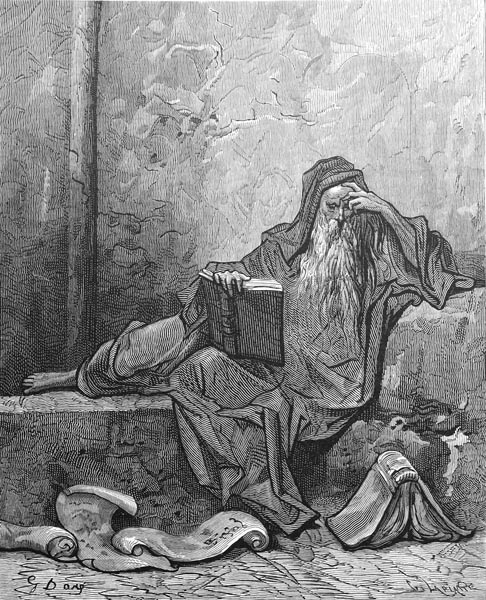
Then I must speak of Beatrice, her sister,
With whom her name shall so well accord,
That, while she lives, shall not only garner
All that delights us here, but her great lord,
Richest of men with her beside him, ever
The sum of human happiness shall afford;
He who, when far too soon she meets her end,
Will midst the depths of misery descend.
While she’s alive, Visconti’s snakes, the Moor
(Il Moro, Sforza’s name) all men shall fear,
From Hyperborean snows to Red Sea shore,
From India to where twin pillars rear
Above both seas, and when she is no more
They’ll fall to servitude, to darkness drear,
With her Milan; all Italy shall untune,
And Chance be there called the sum of Fortune.
Others her illustrious name shall bear,
Flourishing many years before her day:
One shall, thus, the crown of Hungary wear,
While homage to another folk shall pay,
When once disburdened of all earthly care;
To her amidst the saints, true hearts shall pray
And with incense, and with images divine,
They will gather, in Ferrara, to her shrine.
The rest, in silence, I shall here pass by,
Long would it take to tell of so many,
Though of bright clarions, sounding on high,
Every one of them is more than worthy.
Thus, the Lucretias, the Biancas, I
Retain within my heart’s depths, with every
One of those Constances; for, in Italy,
The source of its great Houses they shall be.
For, more than any other, shall your line
Be more than fortunate in its women,
And nor do I, in this brief speech of mine,
Lesser virtue to their female children
Than to the noble wives themselves, assign.
And so that you may note some part, again
Of what Merlin told me of your offspring,
Their praises I no less delight in singing.
Of Ricciarda I first shall speak, worthy
Mirror of chastity and fortitude,
Who, young, remains a widow and, wholly,
Disdainful of fortune. A state oft viewed
By the virtuous, she’ll endure; the lady,
And her children, exiled and devalued,
Sent to Naples by their adversary;
Yet later they’ll reclaim the seignory.
Nor shall I fail to tell of that fair queen
Spring from the ancient root of Aragon,
Her chastity and prudence rarely seen
In either Greek or Roman tales, and none
Such a friend of Fortune; here, foreseen
To be the mother, by Divine election,
Of a trio, who your House shall further,
Alfonso, Ippolito, Isabella;
I speak that is, of wise Leonora,
A happy graft to your most fruitful tree.
What shall I say of Lucrezia Borgia,
Her second daughter-in-law? For she
Shall prove this Leonora’s successor,
And wax in beauty, virtue, chastity,
And good fortune, no less than a shoot
That into fertile soil has sunk its root.
As brass beside gold, or tin near silver,
As the wild poppy next the crimson rose,
As the pale willow by the fir-tree ever,
As stained glass by bright crystal shows,
All will seem dull, next her whom I honour,
All those, as yet unborn, whom I chose
Ere now; one, in wisdom and rare beauty,
In every virtue, of respect most worthy.
And then too, above every other praise
That shall be granted her, alive or dead,
Is that she’ll educate in princely ways,
Her fair Ercole, all her sons so bred,
So, adding honour to their honours’ blaze,
When they their light, on arms or counsel, shed.
Thus, we find, the wine’s aroma, whether
For good or bad, in new casks will linger.
Nor should Renée of France be here forgot,
The daughter-in-law of this Lucrezia.
Of King Louis the Twelfth she’ll be begot,
To Brittany’s glory; in this daughter,
All virtues that adorned a woman’s lot,
Since fire first burned, and was quenched by water,
Or first the heavens circled overhead,
Will be found, in that wife, by virtue fed.
More could I tell of Alda di Sansogna;
Or of the fair Countess of Celano,
Or Bianca Maria, of Catalonia,
Or of the Sicilian princess speak so,
Or the lovely Lippa di Bologna,
Or others, on whom praise men shall bestow;
Yet if to them my sail I chose to lend,
We’d embark on an ocean without end.’
Canto XIII: 74-79: Bradamante is enticed into the enchanted mansion
Once Melissa had ended her account
Of the Este line, to her satisfaction,
And retold how Bradamante might surmount
The wizard’s spell, and evade the mansion,
She halted nearby, yet did not dismount,
Since, concerned now for her own protection,
She would not draw nigh the enchanted place,
Lest she should meet Atlante face to face;
But, once more, counselled the warrior-maid
As she had done a thousand times before;
Then left, alone. Not two miles through the glade
Had Bradamante ridden, ere she saw
A knight that Ruggiero’s form displayed.
Two giants of cruel aspect, furthermore,
Pressed him so that, labouring for breath,
The man seemed but an inch or so from death.
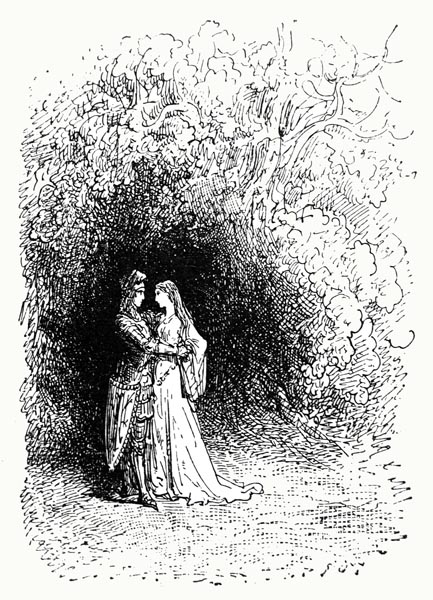
On viewing him, in such deadly peril,
He who seemed to be her Ruggiero,
Her certainty now wavered, thus her will
To carry through the bold design, also.
She thought Melissa, perchance, worked evil,
For some wrong inflicted, that none did know,
And that she sought revenge upon the knight,
And at her hands, whose love for him burned bright.
‘Is this’, she cried ‘not my Ruggerio?
That with the heart, and now the eyes, I see.
If I do not my own beloved know
Whom shall I then behold with certainty?
Why should I yet believe another, so,
When my own sight proclaims that it is he?
Even were I blind, by the heart alone,
Or near or far, my knight would yet be known.’
While her thoughts ran thus, a voice she heard,
Like to Ruggiero’s, one seeking aid,
And witnessed how the knight his charger spurred,
Loosening the reins, fleeing through the glade,
While his fierce enemies, when this occurred,
Charged after him, and valiant progress made,
The maid pursuing, as they chased the knight,
Till the enchanted mansion came in sight.
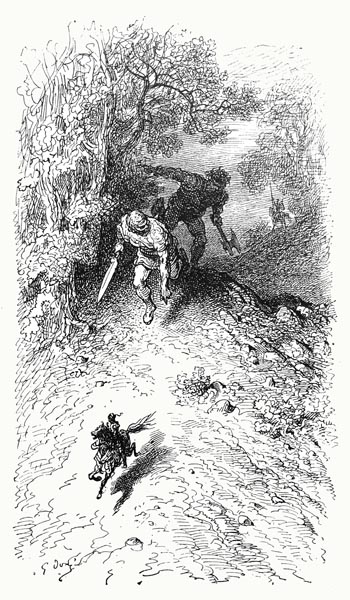
No sooner had she passed the golden door,
Then she succumbed to the sorcerer’s spell,
Each path, right or wrong, forced to explore,
Above, below within, and round the dell;
Nor could she rest by night or day, that law
Bound all who neath the vile enchantment fell.
She saw, and spoke with, her Ruggiero,
Yet neither of them did the other know.
Canto XIII: 80-83: We return to King Agramante and the Moorish camp
But I must leave fair Bradamante there,
(Constrained by the wizard’s vile enchantment)
Whom I shall save, in due time, from despair,
And Ruggiero too, to your contentment.
Just as a wide variety of fare
Rouses the appetite, I now augment
My feast, for the more varied is my tale
The more the dulled palate it may regale,
And many a thread I must spin, to weave
This intricate web on which I labour.
So be not displeased, if I now relieve
Your thoughts by telling of the muster
Of Moorish troops the king did now conceive,
He who menaced the Fleur-de-lys ever;
This Agramante wished his force to number,
That the plain, before Paris, did encumber.
And besides requiring that a count be made
Of the cavalry, and infantry, he further
Proposed to replace in each brigade
The officers he’d lost, knights from Libya,
And Ethiopia, for the troops now strayed,
Since many a company lacked its leader;
And so, he’d ordered now a fresh review,
To number and to shape the ranks anew.
To allow for all those who had been slain
In the conflict, his losses great and little,
He sent his lords to Africa and Spain,
Where they might gather men of mettle,
To fill his camp; then mustered them, again,
With their captains, in order of battle.
But, if you will, I’ll leave to the morrow
All this great host, and to the next canto.
The End of Canto XIII of ‘Orlando Furioso’
